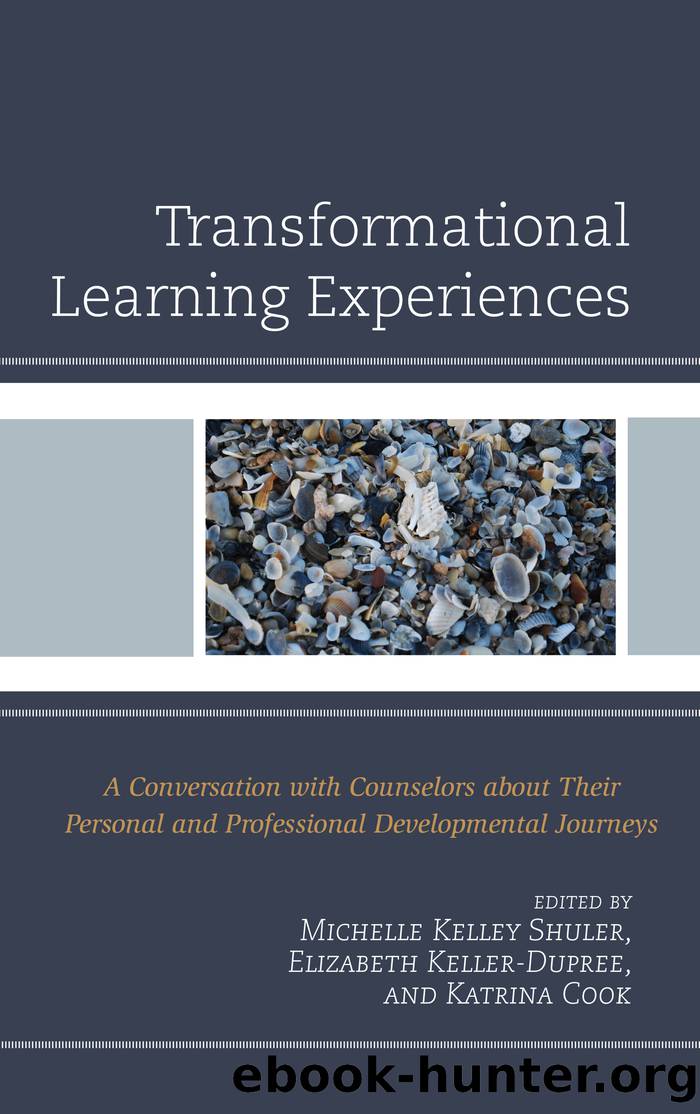Transformational Learning Experiences by Shuler Michelle Kelley;Keller-Dupree Elizabeth;Cook Katrina;

Author:Shuler, Michelle Kelley;Keller-Dupree, Elizabeth;Cook, Katrina;
Language: eng
Format: epub
Tags: undefined
Publisher: Hamilton Books
Published: 2012-08-15T00:00:00+00:00
I believe the majority of counselors-in-training and those in practice do not intend to commit ethical infractions. In fact, many counselors-in-training report they cannot even imagine getting close to making an error. In the real world there may be exceptions to the rule of practicing well and counselors do intentionally disregard or carelessly disregard (Wheeler & Bertram, 2015, p. 2â3) the rules and ethics of the counseling profession. Even so, most practitioners understand and carefully follow the legal and ethical expectations, âyet they still become involved in situations in which a client is harmedâ (or alleges harm) (Wheeler & Bertram, 2015, p. 3).
Realistically in there is a slippery slope and in a second, a counselor can slip and fall. Counselors are ordinary humans living in ordinary settings. They have children, drive cars, pay bills, go to the grocery store, belong to the workout center, and are members of the school board. These daily commitments are part of life; similarly they can create unforeseen ethical challenges such as when your child befriends your child client, your loan officer is a member of your substance abuse treatment group, or you see your client at workout.
In training we learn to respond to the extraordinary circumstances like suicide and confidentiality, but we as counselors in practice may not learn how to professionally react to the daily events in our lives like our families, children, friends, and peers. These daily situations are not manifest destiny to the slippery slopes of ethical violations (Gottlieb & Younggren, 2009), but they can be beginning of cracks in our professional foundation.
Helping professionals do not plan to commit ethical infractions (Herlihy & Corey, 2014; Linton, 2012; Welfel, 2005). Ethical errors are diverse and can include such challenges as dual relationships, fraudulence, impairment, breaches of confidentiality, and practicing below a standard of care. In a national survey on counseling graduate students conducted by Trigg and Robinson (2013), numerous ethical violations were described including: (a) âpracticing outside of the scope of oneâs training and experience and practicing while impaired due to substance use or mental health mattersâ (p. 28), (b) violations of professional boundaries (both nonsexual and sexual), and (c) breaches of confidentiality. Similarly Strom-Gottfried (2003) reviewed ethical complaints to the National Association of Social Workers (NASW) and reported ethical errors such as sexual activity, dual relationships, boundary violations, failure to seek supervision, a lack of using accepted practice skills, fraudulent behavior, premature termination records, informed consent, and referrals. Although a counselor can unwittingly make ethical errors (Linton, 2012; Welfel, 2005; Wheeler & Bertram, 2015), these are especially difficult when working with relationships. The therapeutic boundary is complex and can involve complicated situations and human interactions (Moleski & Kiselica, 2005; Pope & Keith-Spiegel, 2008; Trimberger, 2012; Younggren & Gottlieb, 2004). For example, boundary issues in counseling relationships are a common source of ethical complaints for psychologists. These occurrences may be in part due to the difficulties in navigating multiple relationships, with non-rational, poor reflective processes, internal conflicts, self-serving biases, and an absence of awareness (Rogerson, Gottlieb, Handelsman, Knapp, & Youngren, 2011).
Download
This site does not store any files on its server. We only index and link to content provided by other sites. Please contact the content providers to delete copyright contents if any and email us, we'll remove relevant links or contents immediately.
The Art of Coaching Workbook by Elena Aguilar(51158)
Trainspotting by Irvine Welsh(21636)
The Secret History by Donna Tartt(19036)
Twilight of the Idols With the Antichrist and Ecce Homo by Friedrich Nietzsche(18618)
All the Missing Girls by Megan Miranda(15934)
Cat's cradle by Kurt Vonnegut(15328)
Ready Player One by Cline Ernest(14635)
Talking to Strangers by Malcolm Gladwell(13342)
Fangirl by Rainbow Rowell(9228)
The remains of the day by Kazuo Ishiguro(8968)
The Compound Effect by Darren Hardy(8941)
Thirteen Reasons Why by Jay Asher(8885)
Tools of Titans by Timothy Ferriss(8363)
Periodization Training for Sports by Tudor Bompa(8250)
Wonder by R. J. Palacio(8097)
The Lover by Duras Marguerite(7888)
A Court of Wings and Ruin by Sarah J. Maas(7809)
Change Your Questions, Change Your Life by Marilee Adams(7753)
The Complete Stick Figure Physics Tutorials by Allen Sarah(7362)
